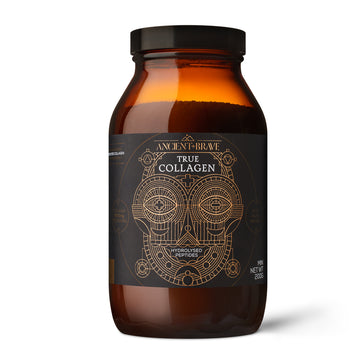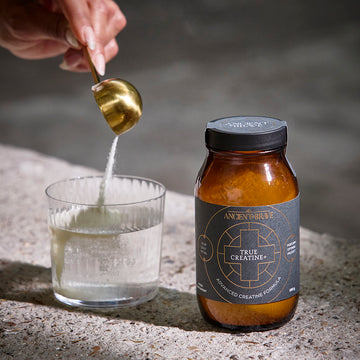Perimenopause (the lead up to the menopause) may affect half of the population at some point and symptoms can span everything from fatigue, sleep issues, brain fog, hot flushes, mood swings, anxiety and physical changes to our skin, hair, bones and joints. With such hormonal changes being dubbed by experts as a ‘second puberty’, these are all the hallmarks of what could be a pretty difficult time for many women which needs to be talked about.
Whilst the menopause is only a single day (the 12 month anniversary of your last period) which on average, happens around the age of 51, perimenopause can start in a woman’s forties and can take anything up to a decade from start to finish.
We can’t stop the natural ageing process, but there are ways to make the road a little smoother. Amongst some of the supplements and dietary changes revealed to support those experiencing perimenopause and post menopausal symptoms, collagen features highly on the list. In this article, Ancient + Brave gives you a whistle stop tour of how collagen can help ease some of the many health issues associated with the change.
Collagen + Oestrogen
Many of the symptoms experienced throughout the menopause journey are related to the flux and change in our hormone levels. Oestrogen is well known for its responsibility along side progesterone in sexual and reproductive health, and yet it plays so many other roles in a woman's body. From supporting the health of our bones and joints to nourishing our blood vessels and heart health amongst other things, there are wide ranging functions affected once production of oestrogen slows.
It may come as no surprise that collagen also plays a key role in all of these bodily systems. The degradation of collagen can be associated with many signs of ageing from poor joint repair to loss of elasticity and fullness in our skin. Collagen production is also closely linked to oestrogen levels, and therefore as oestrogen drops, so does collagen formation.
How quickly can it happen?
In studies, up to 30% of dermal collagen was lost in the first 5 years after the menopause and that levels subsequently reduce at a rate of 2% per menopausal year.
It is important within this time to avoid anything that decreases collagen levels or destroys skin collagen fibres, such as smoking, poor nutrition, stress, and poor hydration. On top of this, research into collagen supplementation for peri-menopausal, menopausal and post-menopausal women has been very promising and has provided us with these potential benefits:
1. Enhanced skin elasticity
As perimenopause hits, your skin can be impacted due to the aforementioned decrease in oestrogen, which causes collagen levels to drop. The result? Reduced collagen leads to diminished elasticity and skin strength (1). The combination of this with dryness also brought about through hormonal changes more fine lines, wrinkles and sagging becomes visible.
However, a 2015 double-blind, randomised clinical trial (2) showed that a supplement containing collagen amongst other compounds, led to significant improvements in wrinkle depth, elasticity, and hydration of the skin in females aged 45-64.
2. Improved bone density
The loss of bone density post-menopause is a worrying side effect of the lack of oestrogen and collagen in the body and can increase the risk of osteoporosis later in life.
Similar to our skin, the fastest rate of bone loss happens in the years after menopause. One reason may be the importance of collagen in bone health. Incredibly, collagen makes up a whopping 90% of bone. Whilst bone mineral content is responsible for stiffness, it’s the connective tissue within bone that is responsible for strength and flexibility.
Many women are also surprised that their joint pain can also be boiled down to low oestrogen. Amongst its many roles, oestrogen is what protects joints and reduces inflammation, so when it drops, inflammation may increase.
In a review of over sixty scientific studies on collagen in people with joint pain, osteoarthritis or osteoporosis, it was found that supplementing with collagen peptides promotes healthy tissue regeneration, collagen synthesis and supports healthy joints and bone density (3). When looking beyond the change, a study with 102 postmenopausal women with reduced bone mineral density (BMD) found taking just 5 grams of collagen peptides daily for a year significantly increased bone mineral density, indicating increased bone formation (4).
3. Improved heart health and circulation
Healthy arteries must be supple in order to function well - provided in large part by collagen. However, the risk of atherosclerosis increases with age and is notably higher after the menopause hits. Encouragingly, small studies have concluded that collagen supplementation may contribute in part to the prevention and even treatment of atherosclerosis and support healthy circulation. (5).
More studies are needed specifically targeting perimenopausal and menopausal women to truly show the potential benefits of collagen, but using the knowledge we have so far we can support each other into the next phase of life by supplying the body with what it needs to successfully make that transition.
When should you start?
Research suggests that the best time to start taking collagen is much earlier than we think. The body's natural collagen production starts to decrease more noticeably around our late twenties, so there could be benefits to getting a head start on boosting the body's collagen levels. However, the good news is there are still many advantages from taking collagen at any age.
Collagen thankfully also has a great safety profile and isn't associated with adverse side effects. On top of this, a daily dose of collagen can also help boost your protein intake which is a key macronutrient needed in our later years to help improve our overall health.
Check out our recipe for Inspired Collagyn Chai Tea here!
- https://www.ncbi.nlm.nih.gov/pmc/articles/PMC6047276/
- https://www.jmnn.org/article.asp?issn=2278-1870;year=2015;volume=4;issue=1;spage=47;epage=53;aulast=Borumand
- https://pubmed.ncbi.nlm.nih.gov/24401291/
- https://www.ncbi.nlm.nih.gov/pmc/articles/PMC5793325/
- https://www.ncbi.nlm.nih.gov/pmc/articles/PMC5429168/
- https://www.ncbi.nlm.nih.gov/pmc/articles/PMC5118756/
- https://www.ncbi.nlm.nih.gov/pmc/articles/PMC6004897/
- https://pubmed.ncbi.nlm.nih.gov/28174772/
- https://www.ncbi.nlm.nih.gov/pmc/articles/PMC3065393/















